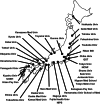Trends in big data analyses by multicenter collaborative translational research in psychiatry
- PMID: 34716732
- PMCID: PMC9306748
- DOI: 10.1111/pcn.13311
Trends in big data analyses by multicenter collaborative translational research in psychiatry
Abstract
The underlying pathologies of psychiatric disorders, which cause substantial personal and social losses, remain unknown, and their elucidation is an urgent issue. To clarify the core pathological mechanisms underlying psychiatric disorders, in addition to laboratory-based research that incorporates the latest findings, it is necessary to conduct large-sample-size research and verify reproducibility. For this purpose, it is critical to conduct multicenter collaborative research across various fields, such as psychiatry, neuroscience, molecular biology, genomics, neuroimaging, cognitive science, neurophysiology, psychology, and pharmacology. Moreover, collaborative research plays an important role in the development of young researchers. In this respect, the Enhancing Neuroimaging Genetics through Meta-Analysis (ENIGMA) consortium and Cognitive Genetics Collaborative Research Organization (COCORO) have played important roles. In this review, we first overview the importance of multicenter collaborative research and our target psychiatric disorders. Then, we introduce research findings on the pathophysiology of psychiatric disorders from neurocognitive, neurophysiological, neuroimaging, genetic, and basic neuroscience perspectives, focusing mainly on the findings obtained by COCORO. It is our hope that multicenter collaborative research will contribute to the elucidation of the pathological basis of psychiatric disorders.
Keywords: COCORO; autism spectrum disorder; bipolar disorder; major depressive disorder; schizophrenia.
© 2021 The Authors Psychiatry and Clinical Neurosciences published by John Wiley & Sons Australia, Ltd on behalf of Japanese Society of Psychiatry and Neurology.
Figures


References
-
- Takaesu Y, Watanabe K, Numata S et al. Improvement of psychiatrists' clinical knowledge of the treatment guidelines for schizophrenia and major depressive disorders using the 'Effectiveness of guidelines for dissemination and education in psychiatric treatment (EGUIDE)' project: A nationwide dissemination, education, and evaluation study. Psychiatry Clin. Neurosci. 2019; 73: 642–648. - PMC - PubMed
-
- Goodman SN, Fanelli D, Ioannidis JP. What does research reproducibility mean? Sci. Transl. Med. 2016; 8: 341ps12. - PubMed
Publication types
MeSH terms
Grants and funding
- JP19H05467/Japan Society for the Promotion of Science
- JP18KT0022/Japan Society for the Promotion of Science
- JP20H03611/Japan Society for the Promotion of Science
- JP20KK0193/Japan Society for the Promotion of Science
- 18K07550/Japan Society for the Promotion of Science
- 18K15375/Japan Society for the Promotion of Science
- 21H02813/Japan Society for the Promotion of Science
- JP21H02851/Grant-in-Aid for Scientific Research
- JP19H03579/Grant-in-Aid for Scientific Research
- JP18K07604/Grant-in-Aid for Scientific Research
- JP18dm0207004/Japan Agency for Medical Research and Development
- JP21dm0307001/Japan Agency for Medical Research and Development
- JP20dm0207069/Japan Agency for Medical Research and Development
- JP20dm0307002/Japan Agency for Medical Research and Development
- JP21dk0307103/Japan Agency for Medical Research and Development
- JP21uk1024002/Japan Agency for Medical Research and Development
- 21K07543/JSPS KAKENHI
- 21H00194/JSPS KAKENHI
- 21K12153/JSPS KAKENHI
- 20K06920/JSPS KAKENHI
- JP18H02542/JSPS KAKENHI
- JP16H06280/JSPS KAKENHI
- JP16H06395/JSPS KAKENHI
- JP16H06399/JSPS KAKENHI
- JP16K21720/JSPS KAKENHI
- 20/JSPS KAKENHI
LinkOut - more resources
Full Text Sources
Medical
Miscellaneous

